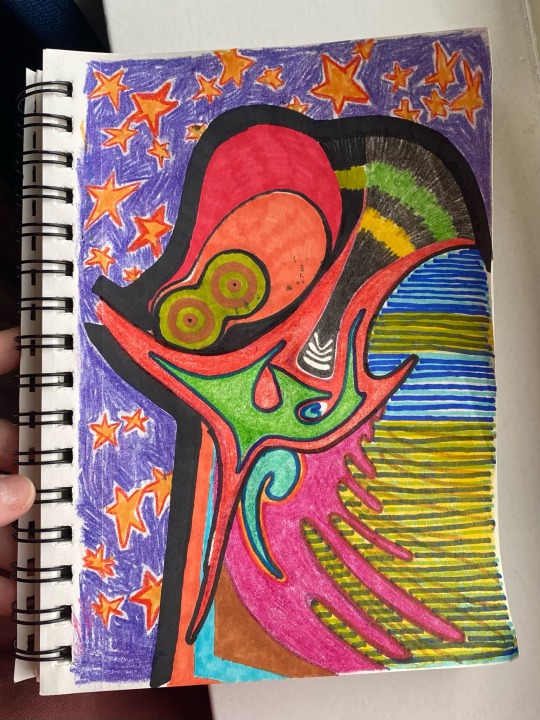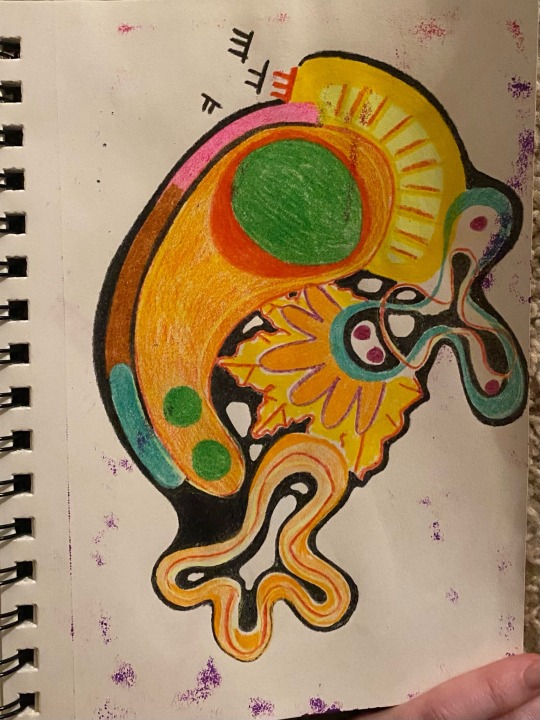Astrological research, creative writing, art, and other whims followed
Don't wanna be here? Send us removal request.
Text
5/14/25

I have moments where openness stretches out in front of me like a meadow unfurling out of the February frost, the performative and empty loops fall away, I can breathe. Unattached and completely present, ten toes on the ground, and a steady flame in my chest.
0 notes
Text
4/29/25
One day Soon I'm going to wake up in a life that's mine
I'll change shoes after work Take my walk Openness in my stomach where tightness used to be Making sure to get plenty of sun So I don't close back up again, Listening closely and responding in real time
0 notes
Text
Archetype: The Fool

Jan Matejko's ‘Stańczyk,' 1862. Stańczyk, depicted here tucked away from a lively royal ball and slumped solemnly in a chair, was the official court jester of Poland during the height of the country's power. While those in the background celebrate a recent victory, Stańczyk has just learned that the Polish city Smolensk was lost to Moscow. It looks as though he has come across some papers discarded by an official, which lie on the table next to Stańczyk's chair. There is a sharp contrast of the lonely jester against the roaring party in the background. It seems that Matejko was suggesting that Stańczyk, who was said to be a brilliant mind, was the only one who could foresee the devastation the war would bring to Poland.
The Fool in the Tarot

The Fool card from the Rider-Waite Smith tarot deck. Artwork by Pamela Colman Smith.
The word "fool" comes from the Latin "follis," referring to bellows or a windbag.

I don't think this is too much of a reach.
The Fool is widely considered to be the most powerful card in the tarot. If you notice the numerical value at the top center of the card, The Fool is assigned number zero. Associated with void space, The Fool is pure, raw potential. He has the ability to transform into absolutely anything - all he has to do is decide where to invest his energy and focus.
It should be noted that there is no official hierarchy to the tarot. There is no formally established ranking system and no card is more powerful or important than another. The idea that the fool card wields a high ground over the others is born out of, at the end of the day, personal opinion. It just so happens to be an opinion that many people in the tarot community share.
The 78 cards in a traditional tarot deck can be divided into two broad categories: the minor arcana and the major arcana. While the minor arcana cards describe day-to-day aspects of life, the majors describe the "big" moments - when we are learning life lessons, embodying a particular archetype of our psyche more than others, perhaps at a meaningful crux, crossroads, or zenith where we have to make pivotal choices that force us to reflect on our own character and values.
The fool is the very beginning of the major arcana cards. The 22 cards comprising the majors can be thought of as describing the "hero's journey," where we start from the nothingness of the fool - directionless, innocent, and totally open to new experiences - and end at the enlightenment of the world - connection, harmony, fulfillment, and total presence. The Fool is a newborn baby. He has no jaded preconceptions about the world, no expectations for the returns on his investments, and the rosiest glasses money can buy.
If you look at the final card of the majors, The World, you will find a clear connection to The Fool card in the circular wreath encompassing the central figure. The woman - naked, exposed, and vulnerable yet totally relaxed, hovers suspended in the sky. The wreath surrounding her can be thought of as a portal which brings us from the total completion represented by this card back to the very beginning, square zero, void space, the blank canvas that is The Fool. The prominent "0" or zero shape in the world card could be thought of as a womb that the fool, being the newborn baby that he is, is born out of.

The World card from the Rider-Waite Smith tarot deck. Artwork by Pamela Colman Smith.

Notes on some of the symbolism in the Rider-Waite Smith Fool card.
Association with Uranus
In the tarot, some cards are ruled by planets and others are ruled by zodiac signs. Aquarius is traditionally ruled by Saturn while it's modern ruler is Uranus (Uranus was discovered well after Saturn was.) The tarot card associated with Aquarius is The Star, but the card associated with Uranus is The Fool.
Astrologically, Uranus represents chaos, sudden change or upheaval, radical ideas and revolution. Associated with our inner need for freedom, Uranus observes where we as individuals and as large groups stagnate. He comes along and knocks down our house(s) of cards and we are left with the task of rebuilding, ie updating our personal and societal ideologies. Uranus demands that we stretch our minds, expand our consciousness. His methods are shocking but ultimately lead us to deeper understanding of ourselves and greater independence.
Uranus's link to fixed air sign Aquarius implies an androgynous energy about this planet. Uranus's foremost concern is with exploring new and out-of-the-box ideas. All this heady energy results in a mercurial, gender-less presentation.
Both the fool and Uranus achieve the extraordinary by being willing to tread where no one else dares to tip-toe. The fool strides towards the cliff and we as spectators look at him with mouths agape. Uranus dismantles entire political regimes and we study these historical periods with awe and fascination. The fool and Uranus are not what I would describe as fearless necessarily. Uranus and the fool both possess powerfully airy, mental, cerebral attitudes. They are so caught up in their ideas about what could be that they don't even consider the risks they could face on their off-beaten paths. There is a radical acceptance here: What used to work no longer works. This is my brand new idea that I think will make things better in the long run. I know you think I'm nuts, but in ten years time you'll be wondering why you weren't on board from the ground floor.
The Divine Child

Duccio di Buoninsgna's ‘Madonna and Child’, 1290-1300.
The divine child is an immature king. He possesses limitless potential and has virtually no ability to do anything with it. In terms of the human psyche, this represents our own unrealized potential - our dreams and fantasies for what our lives could look like, what we think we can do, what we want to do but haven't yet.
Somebody embodying the king archetype has a strong handle on their own executive functioning. They control how they use their time, focus, and energy. Kings have developed the self-knowledge to make goals for themselves that align with their personal values and take consistent strides towards achieving them. Equally as important, they have learned to use self-discipline to delay instant gratification. They are confident in their abilities to create and overcome.
The divine child is like if the king was diffused into a cloud. The king's essence and power is still there, but his ability to make things happen in the physical world is completely lost. The divine child buzzes with primal life force and this is all that he is. Everything, because he contains all possibilities, and nothing, because he does not (cannot) make any of them manifest into reality.
The divine child has the potential to manifest into a shadowy version of himself if the circumstances are right. Have you ever heard the term man-child? This is what happens when the divine child grows up with inappropriate amounts of affirmation/encouragement. Suddenly the saintly baby Jesus-type figure becomes a highchair tyrant. Frustrated over the lack of control he feels in his own life, the divine child resorts to tantrums to bend his surroundings to his will. It's not that he doesn't want to put in the work to create the life that he wants, it's that he is frozen developmentally. He's... a baby. When left unchecked, the child's feelings and displays of entitlement continue into adulthood, where he develops into what many would consider a full-blown narcissist.
The most important overlapping character trait between the divine child and the fool is their pure-heartedness. The archetypal fool is adjacent to the trickster. What sets the fool apart from his more deceitful counterpart is that while the fool and the trickster both behave foolishly, the trickster does so to manipulate others into falling into his traps. The trickster knows that people let their guards down when they think someone is stupid, and he uses this to his advantage. He tricks people purely for his own pleasure and enjoyment, unlike the archetypal clown, who creates comic relief for the enjoyment of others. The clown is more self-aware than the fool. He understands how his bumbling is perceived by others and experiences embarrassment.
The fool is different. The fool acts foolishly because that's just who he is. He isn't putting on an act to make people laugh or to get something he wants. He does not use manipulation or trickery in his dealings with others because he wouldn't know how even if he wanted to - which he wouldn't. While he is often the butt of the joke, the fool has a lightness and innocence to him that makes him continue believing the best in people and the world at large. He dances through life - ignorant, and enviably blissful because of it.
4 notes
·
View notes


































